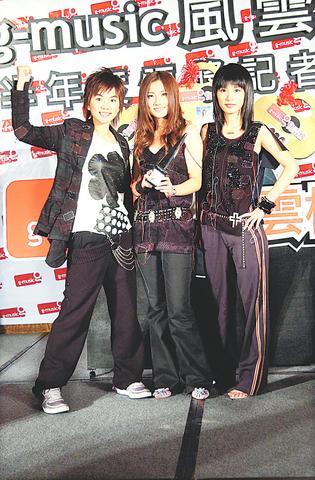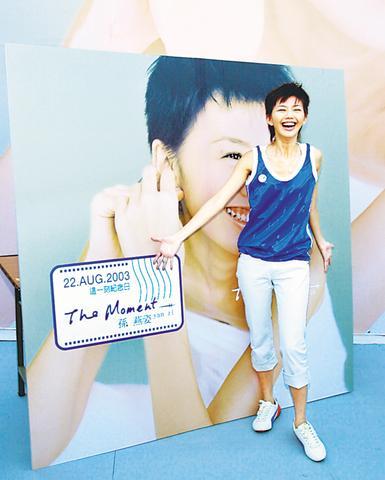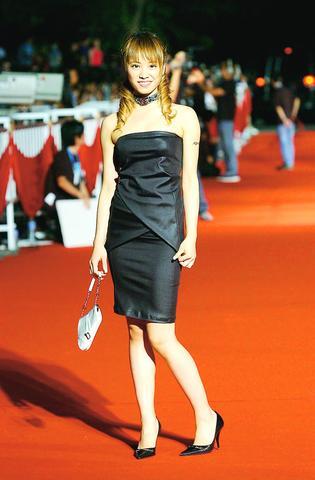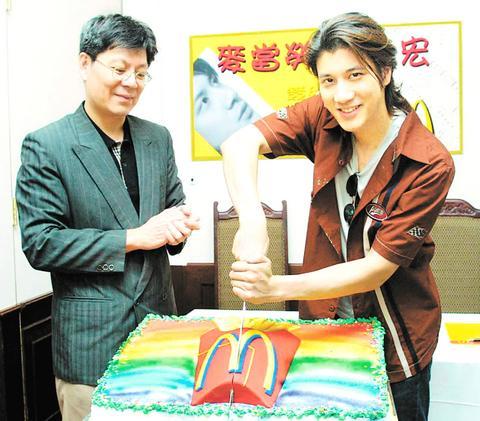It's no secret that Hong Kong singer/actress Anita Mui (梅艷芳) has had some health problems of late, but Next Magazine (壹週刊) seems to be wandering onto thin legal ice in its latest issue by announcing that Mui is suffering from cervical cancer.
Mui has tried to silence the reports in the Hong Kong media about her health problems, to no avail, and threatened to sue anyone who writes erroneous stories on the subject. Never one to fear a lawsuit, Next references unnamed sources to back its claim that Mui has come down with the deadly disease. As evidence, the report says her family allegedly has been burning a lot of ghost money and carrying out various prayer rituals. Also, she's wearing black-bead bracelets that carry religious significance, and spent a night in hospital two weeks ago, where she received numerous mid-night hospital visits from famous friends like William So (蘇永康) and Nicholas Tse (謝霆鋒).

Mui said, however, that her hospital stay was not to treat anything as serious as the tabloids were suggesting. But so far, she hasn't clearly stated what ailment she is suffering from. The ominous element in the story is the fact that her sister died of cervical cancer three years ago at the age of 41.

Leaving the serious stuff behind and diving into the inane news that Pop Stop enjoys most, the gloves have come off and the claws are out in the battle between Sun Yanzi (孫燕姿) fans and S.H.E. fans after the g-music billboard chart was released last week. The chart showed that Yanzi had edged out the cutesy trio of Selina (S), Hebe (H) and Ella (E) to grab first place in sales and since then S.H.E. fans have been going for the jugular in online chat rooms. In the first week of its release on Aug. 22, Yanzi's album The Moment sold over 250,000 copies, just a few thousand more than S.H.E.
Selina and Hebe may have fed the flames of their fans' ire by telling media after the results came out that no matter what the chart says, "S.H.E.'s album will always be number one in our hearts and in the hearts of our fans."

The messages posted by rabid fans were so vitriolic, top executives for Yanzi and S.H.E.'s respective record labels tried to urge restraint from fans and praised their competitors. The calls for harmony are nice, but Pop Stop is really hoping for a rumble in Hsimenting between the two camps.

Leaving the pettiness of Taiwan teenie bopper fans behind, doe-eyed singer Jolin Tsai (蔡依林) took her show to Las Vegas, of all places, for a one-off concert last weekend at the Mandalay Bay resort and casino. It's not certain how many Chinese music fans made the trek to Las Vegas for the show, but she probably doesn't care, the one-hour show earned her a cool NT$2.5 million.
Also earning a quick American buck recently is Lee Hom Wang (王力宏), who signed up with McDonald's for the company's new international ad campaign. Lee Hom will be the voice in Chinese-speaking areas for the four-minute ditty composed by McDonald's headquarters. Just for recording the song, Lee Hom is reportedly raking in over seven figures, albeit in NT dollars.
Lee Hom will be performing in Taipei on Oct. 11 so if you haven't seen the ad on TV by then, you can probably hear the song at the show.
If we're to believe the Liberty Times (自由時報), the past week has seen an invasion of foreign stars looking to run off with Taiwanese people's money.
"If Taiwan's entertainment industry can't improve itself and create a larger space for the arts, then sooner or later, foreign artists will run away with our money," said the paper's column "Scissors" (剪刀) in its edition last Thursday. The column followed up on Tuesday in a piece titled "Korean stars aren't gods" by pillorying Korean TV star Han Jae-seok (韓在石) for failing to show up at a press conference. According to the column, the actor, who was reported to have had to attend an urgent meeting at the time, was not showing the proper respect to the Taiwanese press.
Pop Stop will be curious to see if "Scissors" has anything to say about Japanese E-cup porn star Asakawa Ran coming to Taiwan to launch a new career. Whatever she does, it won't be porn, because that's illegal here, and anyway, the market was cornered by that Taiwan Plumber (台灣水電工) movie that's all over the Web.

Towering high above Taiwan’s capital city at 508 meters, Taipei 101 dominates the skyline. The earthquake-proof skyscraper of steel and glass has captured the imagination of professional rock climber Alex Honnold for more than a decade. Tomorrow morning, he will climb it in his signature free solo style — without ropes or protective equipment. And Netflix will broadcast it — live. The event’s announcement has drawn both excitement and trepidation, as well as some concerns over the ethical implications of attempting such a high-risk endeavor on live broadcast. Many have questioned Honnold’s desire to continues his free-solo climbs now that he’s a

Francis William White, an Englishman who late in the 1860s served as Commissioner of the Imperial Customs Service in Tainan, published the tale of a jaunt he took one winter in 1868: A visit to the interior of south Formosa (1870). White’s journey took him into the mountains, where he mused on the difficult terrain and the ease with which his little group could be ambushed in the crags and dense vegetation. At one point he stays at the house of a local near a stream on the border of indigenous territory: “Their matchlocks, which were kept in excellent order,

Jan. 19 to Jan. 25 In 1933, an all-star team of musicians and lyricists began shaping a new sound. The person who brought them together was Chen Chun-yu (陳君玉), head of Columbia Records’ arts department. Tasked with creating Taiwanese “pop music,” they released hit after hit that year, with Chen contributing lyrics to several of the songs himself. Many figures from that group, including composer Teng Yu-hsien (鄧雨賢), vocalist Chun-chun (純純, Sun-sun in Taiwanese) and lyricist Lee Lin-chiu (李臨秋) remain well-known today, particularly for the famous classic Longing for the Spring Breeze (望春風). Chen, however, is not a name

There is no question that Tyrannosaurus rex got big. In fact, this fearsome dinosaur may have been Earth’s most massive land predator of all time. But the question of how quickly T. rex achieved its maximum size has been a matter of debate. A new study examining bone tissue microstructure in the leg bones of 17 fossil specimens concludes that Tyrannosaurus took about 40 years to reach its maximum size of roughly 8 tons, some 15 years more than previously estimated. As part of the study, the researchers identified previously unknown growth marks in these bones that could be seen only